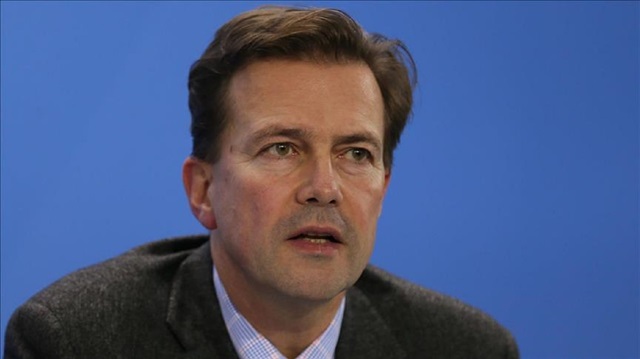
Angela Merkel's spokesman rules out decision on possibly stopping Turkey’s EU membership talks before Sept. 24 polls
Chancellor Angela Merkel’s spokesman has ruled out an imminent decision on the future of Turkey’s EU membership talks, despite recent campaign calls by the country’s Social Democrats to stop the negotiations.
Speaking at a press conference in Berlin on Monday, spokesman Steffen Seibert said there won’t be any decision on Turkey's EU membership talks before Germany’s general elections later this month.
“There is no major European gathering before parliamentary elections in Germany on Sept. 24," he said.
“The European Council meeting in October will also review current relations with Turkey. And as the chancellor said yesterday, she will discuss there with her European counterparts whether or not to terminate membership negotiations,” he added.
The EU’s head of states and governments are scheduled to meet in Brussels on Oct. 19-20 for a planned European Council meeting.
Seibert underlined that any decision to end Turkey’s membership talks would require unanimity among all EU member states.
He also warned that bringing termination to the agenda but failing to achieve unanimity would be “a very bad sign” for the EU.
Merkel and her Christian Democratic bloc (CDU/CSU) had long opposed Turkey’s full EU membership, but supported continuation of accession negotiations in an open-ended way, which was promised to Ankara before the CDU/CSU came to power in 2005.
Merkel came under enormous pressure during a televised debate on Sunday night when Martin Schulz, her social democrat rival, called for a tougher line on Turkey due to escalating tensions between Ankara and Berlin.
In a surprise move, the Social Democratic Party (SPD) leader suggested immediately stopping Ankara’s EU membership talks and freezing €4 billion ($4.68 billion) in pre-accession funds.
Merkel, caught unprepared for such a move, first cited how the coalition government's Foreign Minister Sigmar Gabriel, also a social democrat, has so far opposed ending Turkey’s EU membership talks.
The chancellor also said stopping Turkey’s EU membership talks might send the wrong message to those Turkish citizens who continue supporting democratic reforms and the country’s EU membership perspective.
But later in the debate, Merkel also sharpened her tone towards Turkey, and underlined her opposition to Turkey’s full membership.
She promised to talk to her European colleagues to see if there was a common understanding among them on a potential decision to end Turkey’s EU membership talks.
The SPD’s surprise move on Sunday came amid considerable decline in support for the Social Democrats, with polls only three weeks out.
Recent polls show Merkel’s Christian Democratic bloc is likely to win 38 percent of votes in the Sept. 24 elections, while the SPD is polling at 24 percent.
Schulz, the SPD’s candidate for chancellor, had previously advocated Turkey’s EU membership, but recently signaled a policy change and sharpened his criticism of developments in Turkey.
Tensions between Berlin and Ankara further escalated last week after the arrest in Turkey of two German citizens of Turkish descent on suspicion of supporting terrorist groups.
Since the July 2016 defeated coup attempt in Turkey, more than a dozen German citizens have been arrested on suspicion of providing support to illegal or terrorist groups.
While German politicians demanded their immediate release, Turkish authorities repeatedly stressed that the country’s judiciary is independent, ruling out any political influence on legal procedures.
Ties between Ankara and Berlin have been strained since the defeated coup attempt, as Turkish leaders slammed Germany for turning a blind eye to outlawed groups and terrorist organizations hostile to Turkey.
German politicians, on the other hand, voiced concerns over the rule of law and human rights issues amid widespread investigations by Turkish authorities into the Fetullah Terrorist Organization (FETÖ), which orchestrated the defeated coup attempt that left 250 people martyred and nearly 2,200 injured.
FETÖ has a large network in Germany, with dozens of private schools, businesses, and media organizations.
Since the defeated coup attempt, nearly 4,000 FETÖ suspects have come to Germany from Turkey and other countries, according to local media reports.
Despite repeated requests by Ankara to arrest leading FETÖ figures, German authorities have turned down extradition requests, arguing that Ankara should first provide sound legal evidence.
Apart from FETÖ, the terrorist PKK organization is also active in the country, and carries out significant propaganda, recruitment, and funding activities.
The group has nearly 14,000 followers among Germany’s Kurdish immigrant population, according to the German domestic intelligence agency BfV.




